Methodology Can Shape Method theorem (Barseghyan-2015)
This is an answer to the question Role of Methodology in Scientific Change that states "A methodology can shape employed methods, but only if its requirements implement abstract requirements of some other employed method."
Methodology Can Shape Method theorem was formulated by Hakob Barseghyan in 2015.1 It is currently accepted by Scientonomy community as the best available answer to the question.
Contents
Broader History
The distinction between methods and methodologies was not articulated in depth before Barseghyan (2015). Philosophers of science up to and including Karl Popper and Imre Lakatos understood the philosophy of science as two pronged, being both a descriptive and normative enterprise. In this way, any descriptive account of the method employed by scientists in accepting theories should likewise act as an explicit normative account of the method that scientists ought to employ.1
Even Laudan’s reticulated model2 failed to make the distinction between method and methodology, insofar as to offer examples of changing method as the change in a community’s explicit descriptions of their method. For example, Laudan described how Newtonian scientists changed their methodological standards to a hypothetico-deductive approach, upon realizing that they were not accepting theories by their previously attested standards. However, this moreso describes the influence of method on a stated methodologies, rather than vice versa.
Scientonomic History
In Barseghyan (2015), Methodology was originally understood as a kind of explicit, concrete method which can be employed insofar as it implemented more abstract requirements of an employed method as given by the Third Law. Thus, the role normative methodology plays in the process of scientific change is a creative role, in which methods are changed through the generally more free process of implementing abstract requirements.
This theorem followed from the the original formulation of the Third Law and original formulation of methodology, however, the new definition of methodology ought to alter how methodologies, now understood as a kind of Normative Theory, ought to interact with the new Third Law.
Acceptance Record
| Community | Accepted From | Acceptance Indicators | Still Accepted | Accepted Until | Rejection Indicators |
|---|---|---|---|---|---|
| Scientonomy | 1 January 2016 | The theorem became de facto accepted by the community at that time together with the whole theory of scientific change. | Yes |
Question Answered
Methodology Can Shape Method theorem (Barseghyan-2015) is an attempt to answer the following question: What role do methodologies play in scientific change? Are methodologies capable of affecting employed methods?
See Role of Methodology in Scientific Change for more details.
Description
A methodology can affect an employed method when it implements one or more abstract requirements of another employed method. Thus, the role normative methodology plays in the process of scientific change is a creative role, in which methods are changed through the implementation of other abstract requirements from some other employed method.
This theorem follows from former description of the third law, which states that a method becomes employed only when it is deducible from other employed methods and accepted theories of the time.
This description of the third law leaves room for methodologies’ to play an active role in scientific change in cases when a concrete method fulfills the requirements of an employed abstract method. The same abstract requirements can usually be implemented in a wide range of different ways. For instance, if there is a whole array of concrete cell counting methods all implementing the same abstract requirement that when counting the number of cells, the resulting value is acceptable only if it is obtained with an "aided" eye.1pp. 151-152 In such cases, methodology can play a decisive role in method employment; what later becomes the requirements of the employed method can be first suggested as a methodology. Thus, the double-blind trial method was first devised as a methodology, as a set of explicitly stated rules, and only after that did it become actually employed as a method of drug testing.1pp. 240-243
Sebastien (2016)'s new definition of methodology offers an alternate means for methodologies to shape methods, although this is not stated in the existing formulation of the theory. Because methodology is understood as a subkind of Normative Theory, it should be possible for the Third Law to deduce an abstract method from a set of theories including some of the normative methodologies a community holds about their method. In this way, it would be necessary for this method to take into account how the community believes its method works, in any concrete implementation of said method, just as a community takes into account descriptive theories (e.g. the placebo effect and experimenter's bias) when employing a new method.
Reasons
No reasons are indicated for this theory.
If a reason supporting this theory is missing, please add it here.
Questions About This Theory
There are no higher-order questions concerning this theory.
If a question about this theory is missing, please add it here.

